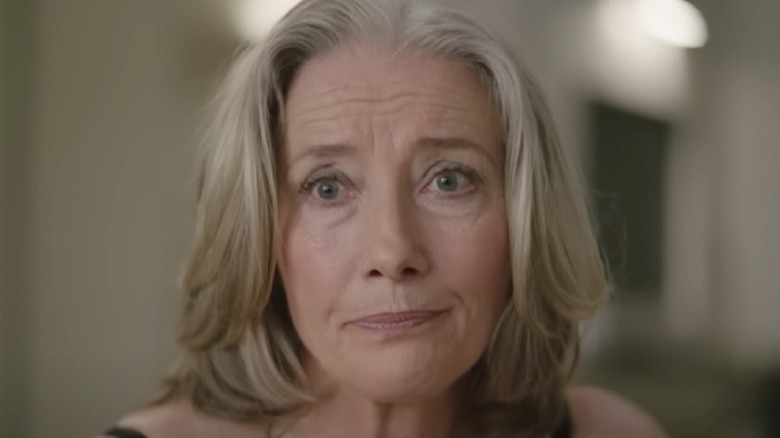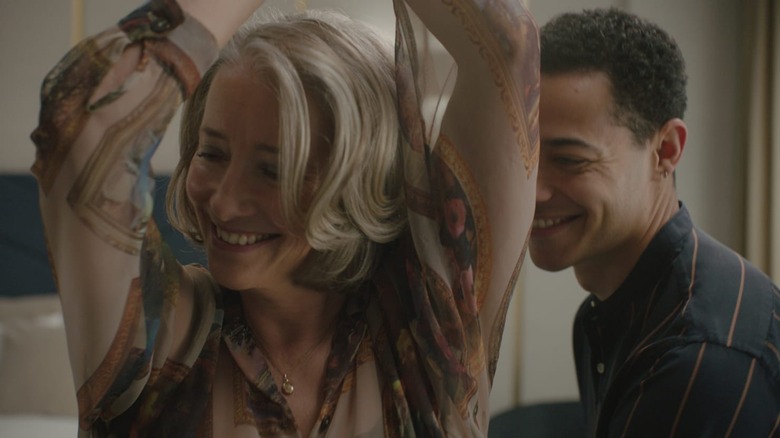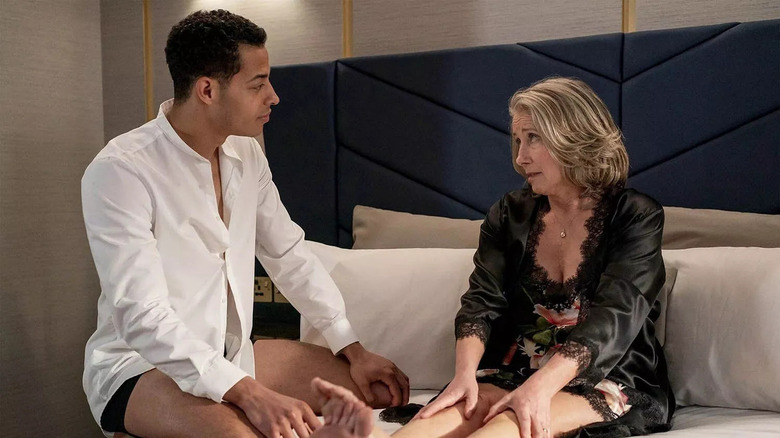Good Luck To You, Leo Grande Review: Grande By Name, Grand By Nature
- Two excellent lead performances -- including a star-making turn for Daryl McCormack
- A funny screenplay that combats ageist and anti-sex work stereotypes
- Set almost entirely in one hotel room, but never feels like a play
- The characters are well written, but there are no surprises in their arcs
It used to be the tell-tale sign that a film was based on a play. Now, a movie built around two actors in a small handful of interior locations is a clear indicator that we're watching a Covid-era production — something only emphasized further by the few scenes set in the outside world, where city streets and supposedly busy restaurants are distractingly empty. But that feeling of detachment from the rest of the world works to the advantage of "Good Luck to You, Leo Grande," the Sundance smash from director Sophie Hyde. It connects a fear of being afraid to express sexual desire to becoming increasingly detached from those around you, showing how a refusal to confront any fantasies in the bedroom is a slippery slope towards emotionally withdrawing from the wider world at large.
This is a film that has been marketed entirely on its steamy nature; in the U.K., where the film will release in theaters (in the U.S., it will be available to stream on Hulu on Friday, June 17), every single poster centers pull quotes highlighting just how "sexy" the film is. It may be undeniably sex- and body-positive, but this is a misrepresentation of what to expect. Yes, it openly discusses sexuality in frank terms, but it's more of an exploration of the emotions that underpin those desires, or refusal to accept them — those expecting a broad sex comedy may be disappointed that the film proves to be intimate in a different way than advertised.
A middle finger to ageist stereotypes
Two years after the death of her husband, and shortly after her retirement as a high school teacher, Nancy Stokes (Emma Thompson) is ready to experience the one thing that has eluded her for her entire life: pleasure. Booking out a hotel room and a younger sex worker who goes by the alias Leo Grande (Daryl McCormack), she's ready to have the first fulfilling sexual encounter of her life — that is, until she starts having a panic attack, and realizes her desires aren't easy to act upon when they've been repressed for so long. Over the course of several encounters, she starts to open up, but as she talks more about her own life, she finds herself increasingly invested in trying to find the real man behind the Leo Grande persona opposite her — a discovery that will have dramatic consequences.
Much has been written about the scarcity of substantial roles for older actresses, and the inherent ageism in the industry that ensures the parts they do get are never of the sexually liberated variety. The character Nancy Stokes in many ways feels like an unspoken commentary on this stereotypical representation: a woman who has spent her life internalizing all the different ways women are supposed to behave, both in the bedroom and out of it, finding herself afraid to confront any feelings that don't fit into this socially accepted mold.
"Good Luck To You, Leo Grande" is strongest in its early stages, where Nancy's anxieties over participating in the transactional sexual encounter open up a pandora's box of thoughts and feelings she's struggled to vocalize. We learn that everything from her relationship with her children to her abilities as a teacher have been tainted by the same repression that led her to remain eternally silent about her desires. Best of all, Katy Brand's screenplay fleshes this out in a way rooted in Nancy's obvious social anxiety — her relentless oversharing doesn't just play out like a therapy session in all but name, the way a more sloppily written version of this movie would guide the audience towards each emotionally revelatory beat. Everything feels well earned, despite the dramatic contrivances that have led both characters to the hotel room.
It may have more explicit discussions about bedroom behavior than her typical starring role, but the central theme of repression connects "... Leo Grande" to many of Thompson's most celebrated roles. You need to look no further than 1992's "Howards End," for which Thompson won an Oscar for best actress, to find another rich character study about a relationship built between two people who are inherently disconnected, their refusal to confront it provoking lingering unhappiness. Although more explicit in content, "Leo Grande" might be far gentler emotionally — this does, after all, pick up two years after the traumatic end to her previous marriage, the lead character almost ready to follow her heart after decades of compromising it.
A very British affair
Sophie Hyde's film was one of the hot tickets at this year's virtual Sundance, with Searchlight Pictures spending approximately $7.5 million to snap up the distribution rights. On the surface of it, this makes complete sense; there's a universality to its body-positive themes and its firm belief that sexuality shouldn't be something restricted to younger people only. But I suspect it might be a harder sell to audiences outside of the UK than expected, due to how rooted it is in Britain's conservative social mores – something else that connects it to those earlier Merchant/Ivory films in which Thompson starred, such as the aforementioned "Howards End." The broad strokes of the emotional arc translate effortlessly across the Atlantic, but there are several cultural specificities related to the British middle class that might seem more like character quirks than an integral part of understanding this character.
Take the way Nancy talks openly about finding her son boring and showcases barely hidden contempt for her daughter, feelings which are never resolved while others are reconciled. She may become sexually liberated over the course of the drama, but this doesn't refute her socially conservative mindset — older people will still look down upon those younger, even if in Nancy's case, they want to feel "16 again," if only for a moment. She may become more confident in herself, but she only backtracks on some of her earlier beliefs (such as calling some of her pupils "sluts" for wearing skirts to school) when it appears like she'll be outed for being a hypocrite. There's no better illustration of the British conservative mindset than this, and it makes for a far more interesting character study than if the encounters with Leo Grande transformed her entire personality over the course of a few hours.
Speaking of Leo Grande, Daryl McCormack's performance as the titular character deserves to be a star-making role for the Irish actor. Previously best known for a supporting role in the BBC's "Peaky Blinders," this is a part oozing with charm, tailor-made for any movie star-in-waiting. But there's a tougher balancing act going on beneath this — the character has to represent a fantasy you can (quite literally) buy into while subverting any negative preconceptions of sex work the audience might have. It can never become a romantic comedy in the gender-swapped "Pretty Woman" mold and the film is self-aware as to the artificial nature of the encounter; he needs to have a deeper complexity than the transactional nature of his job allows, but he also needs to have an immediate charm that continues to keep you sucked in. The performance is defined by navigating the path between those two contrasting tones but does so in a way that feels effortless. Casting directors take note.
We may be stuck inside one stuffy hotel room, but thanks to smart, funny writing and two excellent performances, "Good Luck to You, Leo Grande" is a lot more engaging than your average Covid-era filmmaking exercise.


